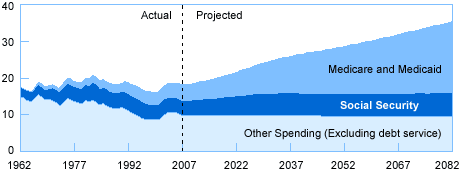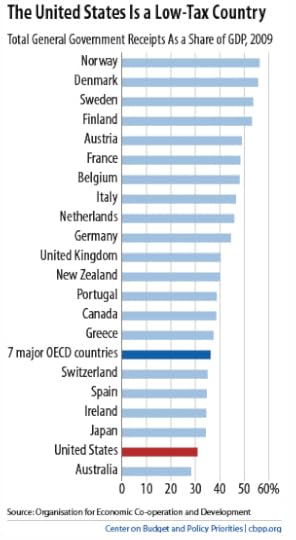Matthew Yglesias's Blog, page 2321
May 9, 2011
A Top-Down Disaster

Paul Krugman has a great column about the effort by the transatlantic policy elite to blame current problems on politicians' undue willingness to placate the public:
The answer is, three main things. First, there were the Bush tax cuts, which added roughly $2 trillion to the national debt over the last decade. Second, there were the wars in Iraq and Afghanistan, which added an additional $1.1 trillion or so. And third was the Great Recession, which led both to a collapse in revenue and to a sharp rise in spending on unemployment insurance and other safety-net programs.
So who was responsible for these budget busters? It wasn't the man in the street. [...]
The real story of Europe's crisis is that leaders created a single currency, the euro, without creating the institutions that were needed to cope with booms and busts within the euro zone. And the drive for a single European currency was the ultimate top-down project, an elite vision imposed on highly reluctant voters.
I think it's important to recognize that this was no accident either. Technocratic leaders like Alan Greenspan were on hand to explain to elite audiences that dissipating budget surpluses and preserving a high level of indebtedness was the point of the Bush tax cuts, while European elites hoped that pushing forward with monetary union would force a level of political integration that European voters wouldn't otherwise accept. It's true that if we adopted a strict "listen to the voters" approach we'd wind up trying to balance the budget exclusively through foreign aid cuts. But that doesn't change the fact that what we're largely living through is a massive failure of elite governance with key concepts in national security policy and financial regulation revealed as bankrupt.


Preserving Medicare As We Know It Is An Option
I don't think that preserving Medicare exactly as currently structured is a good idea. To me, simply allowing current CBO projections of Medicare spending to take place would represent an inefficient use of social resources. That's why it's a good thing that the Affordable Care Act contained a large number of small changes to Medicare, small changes that will hopefully provide a basis for further reforms. But to write, as The Washington Post editorial page does, that "simply preserving Medicare as we know it is not an option" is false.
Here's the scary CBO chart:

Scary! But we could do this. We could, for example, reduce military spending from its current 4.7 percent of GDP down to the UK's level of 2.7 percent of GDP. Conceivably, we could go even lower. Canada spends 1.5 percent of GDP and Mexico spends just 0.5 percent of GDP, and since the US has a much larger GDP than Canada's we could presumably go all the way down to Canadian levels without opening ourselves up to the risk of foreign conquest. Still, that wouldn't get us all the way to where we need to be. Fortunately, American taxes are low by international standards:

Now to be clear again, I don't think it would be a good idea to adopt Dutch-levels of taxation in order to preserve the exact current structure of Medicare. One of the reasons why the Netherlands is such a nice country is precisely that those high taxes aren't just all sucked up by senior citizens' health care, and instead go to fund a much broader array of social services. But there are a wide array of possibilities here. One possibility, backed by House Republicans, is to stick with America's customary level of taxation, and stick with its hegemonistic military aspirations, and make that work (in part) by completely abandoning our traditional commitment to Medicare. But doing the reverse and sticking with our traditional commitment to Medicare by abandoning our tradition of very low taxes is equally possible. Pretending that it's not is a way of loading the dice in favor of one approach.


'Game of Thrones' Open Thread: Outcasts
By Alyssa Rosenberg
As always, spoilery discussions are fine, just label them as such at the outset, please.
One of the things I like best about Game of Thrones is the way the series deals with people who don't fit into the roles proscribes for them by society. Fantasy stories typically deal with people who are a little bit different, the girl who wants to fight like a man, the poor boy elevated to kingship, the power that feels like a curse but that turns out to be a gift. While achieving those dreams or adjusting to those unexpected transitions isn't automatic, it's generally relatively simple: you go on a quest, you achieve some sort of great feat, and people learn to tolerate your unusual ambitions, or even to embrace them.
But one of the things the Game of Thrones universe does best is to shake up the fantastical expectation that it's reasonably easy for unusual people and people with unusual ambitions to make a place for themselves in rigid societies. The show insists that it's difficult enough to fit into pre-approved roles if they're available to you, and even harder to find a place for yourself if you're unlucky enough not to slot into a pre-approved role at all.
There are all kinds of ways to be an outcast, of course. Jon Snow is an acknowledged bastard, but growing up as the shade of legitimate children has left him unable to function either as a nobleman or as an ordinary person. Gendry, the king's bastard we meet in this episode, may be a mere blacksmith's apprentice, but he's not wracked with the discontent John feels. Samwell Tarly isn't just his father's legitimate son, he's his heir, but his father hates him so much he tells Sam he has to take the black or "If you do not, he said, then we'll have a hunt. And somewhere in these woods, your horse will stumble, and you'll be thrown from your saddle to die. Or so I'll tell your mother. Nothing would please me more." It's not enough to have your bloodlines intact, to be born into a role: you have to fit it exactly, or be cast out of it.
Even given all of that, if you're illegitimate, awkward, fat, criminal, or cast out of polite society, there's a place for you, a society you can integrate into, as long as you're an able-bodied man. If you're a dwarf like Tyrion Lannister, you can't make another life for yourself as a hedge knight, or a man of the Night's Watch, or an outlaw—things are expected of you, so you have to stay in polite society, but you can either claim your outcast status, or suffer through it. If you're a woman like Sansa Stark, who takes well to the circumscribed role of a noble lady, you still have to live with the terror of the part of your role you can't control: whether you'll have children, and whether they'll be the right kind of children. And if you're a girl like Arya, you can say that it's not for you to be the lady of a holdfast and bear knightly sons, but rejecting that leaves a big blank in your future. The show (and the books) have a real respect for all these dimensions of difficulty.


Rwanda Banning Bicycle Taxis From Kigali

Rwandan bicycle taxi (cc photo by configmanager)
On the recommendation of Twitter followers, I'm currently making my way through Jason Stearns' book on Congo, and it turns out he's also a blogger and through him I saw Barrie Terreblanche's article about what seems to be a surplus of zealousness in the Rwandan government's efforts to clean up the country's image. This bit struck me for its basic structural similarity to things that happen in the West:
There is an argument that some government decisions are taken more for the sake of boosting the image of Rwanda as a modern society than in the interest of its people. A retired politician who spoke on condition of anonymity for fear of being branded unpatriotic, points to a recent decision to ban bicycle taxis from the streets of Kigali, leaving hundreds of young men out of work. This, he says, was done merely to improve the image of Kigali.
The permanent secretary of finance, Kampeta Sayinzoga, counters by arguing that the decision was taken to bring down an unacceptably high number of accidents involving the bicycles.
It seems to me that the typical "tell" in these situations is that the Rwandan government isn't actually banning bicycles. They're just going after a specific socially disfavored form of commerce.


The Challenging Mathematics Of Producing Economically Integrated Schools
I remarked on Twitter late last week that it would be helpful to integrate certain education policy debates with housing policy controversies. After all, the super-naive answer to poorly performing public school systems is that families should just move. Every metropolitan area in the country includes a wide array of school districts and many districts contain a wide array of schools. Of course in practice that answer's not available to poor families, but there are policy reasons that it's not possible.
But the Century Foundation took an important look at this issue with Heather Schwarz's report (PDF) "Housing Policy Is School Policy: Economically Integrative Housing Promotes Academic Success In Montgomery County, Marland" about the education policy benefits of Montgomery Country's inclusionary zoning. The benefits here are substantial, but this passage also serves as an indication of how difficult to math is:
The academic returns from economic integration diminished as school poverty levels rose. Children who lived in public housing and attended schools where no more than 20 percent of students qualified for a free or reduced price meal did best, whereas those children in public housing who attended schools where as many as 35 percent of students who qualified for a free or reduced price meal performed no better academically over time than public housing children who attended schools where 35 to 85 percent of students qualified for a free or reduced price meal.
This is important stuff. But note that 21 percent of American children are in households below the federal poverty line and the cutoff for receiving the reduced price school lunches is family income of less than 185% of the federal poverty line. Under the circumstances, it would be literally impossible for all children to go to schools where fewer than one fifth of the kids come from lunch discount families. On the contrary, if poor children were spread evenly across schools nobody would be attending a low-poverty school. Since education is tethered to geography in so many different ways, I think housing policy is nonetheless necessarily part of the picture when you're talking about schools. But there's no way to solve the problems of high-poverty schools merely by dispersing people. You need to actually attack the poverty, and you need to actually get better outcomes out of schools.


May 8, 2011
Hamed Haddadi

The Memphis Grizzlies were never on TV until the start of their remarkable playoff run, so one of several things I didn't really know about them is that they have a little used Iranian reserve center named Hamed Haddadi. And damn if he isn't actually putting up excellent numbers in his limited minutes. This year he grabbed 2.2 rebounds and scored 2.4 points per game off 51.7 percent field goal shooting in his measly 5.4 minutes per game. Obviously, you can't base much on such a small sample, but it at least suggests that if he were putting in a full 15-20 mpg stint as a backup he could perform well.
Seems to commit a ton of fouls, so it's not really clear he could stay on the court longer than that. But the guys like Darrell Arthur and Hasheem Thabeet who Memphis is currently using as backup big men are really bad. Any reallocation of minutes at the margin to Haddadi is likely to make this team even more impressive.


Note To Self: If You Ever Amass $7.8 Billion Fortune, Just Sell
FT reports on Ivan Glasenberg's meteoric rise to riches based on commodity trading: "Mr Glasenberg's stake in Glencore could be valued at $10bn this month but he will be as vulnerable to a post-IPO descent as Stephen Schwarzman of Blackstone, whose wealth fell from $7.8bn that year to $2.5bn two years later, according to Forbes magazine."
There seems to me to be an important life lesson here. If you ever find yourself with $7.8 billion in the bank, maybe just leave the casino on a high note? Surely that's enough money. If you don't just walk away, you find yourself vulnerable to the absurd situation of being the guy with a $2.5 billion fortune who's being mocked in newspapers as a cautionary tale about poor financial management. Nobody needs that. Just walk away!


Tough Times In Post-Revolutionary North Africa
Mary Beth Sheridan for the Washington Post reports that things are not looking up for the economies of Egypt and Tunisia:
The largely peaceful uprisings in Egypt and Tunisia have battered the countries' economies. Tourism has collapsed; interest rates have jumped. Economic growth in the two countries is expected to plunge as much as four percentage points from last year, according to the International Monetary Fund. The squeeze comes as those nations' interim governments are trying to create jobs to satisfy the young protesters' demands.
One major worry I have about the revolutions in both those countries is that they were driven at some important level by popular anger over commodity price dynamics and fall-behind immiseration that the new governments won't really be able to address. The US is apparently working out a debt relief package, which is nice and should buy some time, but meanwhile we've got sectarian riots.


SF Park — More Than An Ap
Matt Richtel's NYT story about San Francisco's innovative SF Park initiative worries me that it might mislead some people. He focuses heavily on the use of smartphone aps to help inform people about where vacant spots are. That's a neat idea, but the core of the initiative is the use of better pricing schemes so as to allocate the spaces efficiently:
Parking will also frequently cost less. SFpark will adjust meter prices based on demand to encourage drivers to make trips in off-peak hours and to use parking lots and garages. While high-demand spaces will gradually go up in price, other spaces will decrease in cost.
As meter and garage pricing shifts to increase availability, instead of some blocks being full and others empty, the goal is to have, on average, at least one parking space available on every block. Once a space is found, longer time limits and new meters that accept credit and debit cards will make it easier to avoid parking tickets.
The high-tech stuff is park of making this user friendly, but the key "technology" being deployed is the idea that parking spaces should be allocated via supply and demand rather than via the central planning, rationing (park here cheaply, but only for an hour!), queueing (circle the block!), and other Soviet methods typically used in American parking policy.


Bees In My Neighborhood
After all my NIMBY-bashing, I don't really want to be "that guy" but am I crazy to be somewhat alarmed that they're trying to import more honeybees into my neighborhood? I don't want to get stung! Hoisted on my own petard, I guess, so I won't complain.


Matthew Yglesias's Blog
- Matthew Yglesias's profile
- 72 followers




